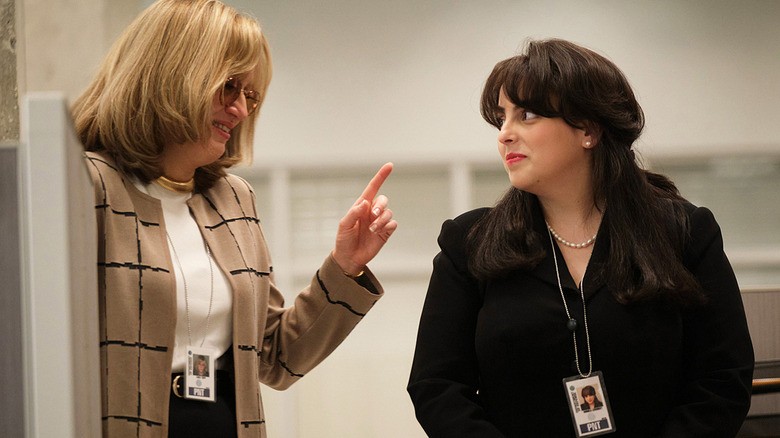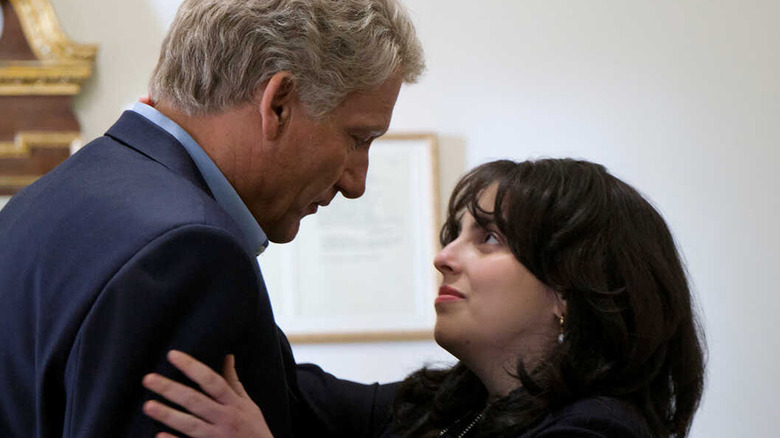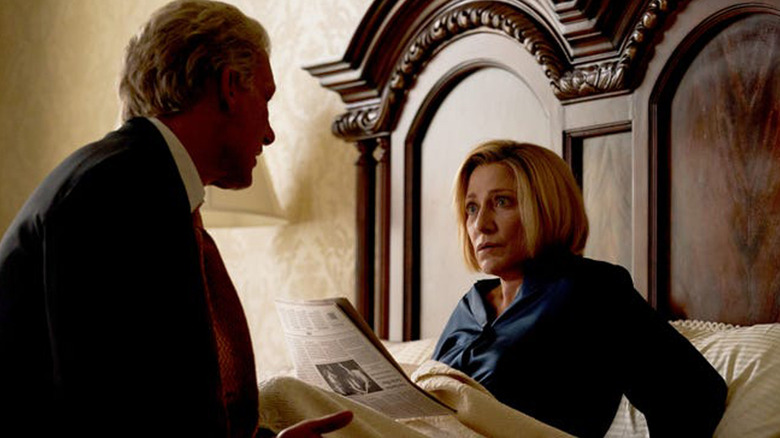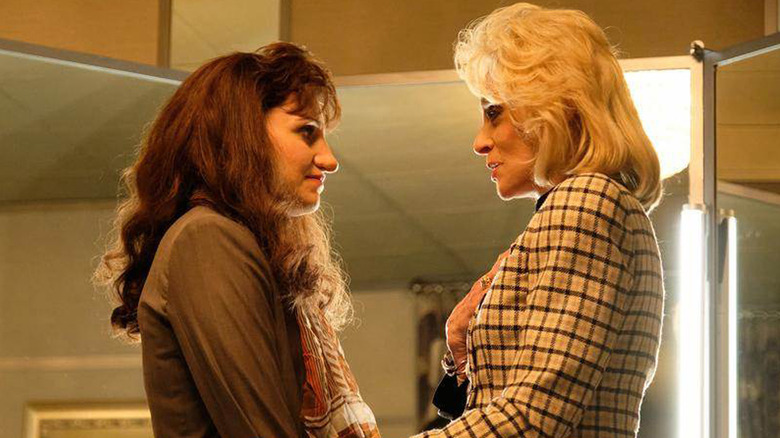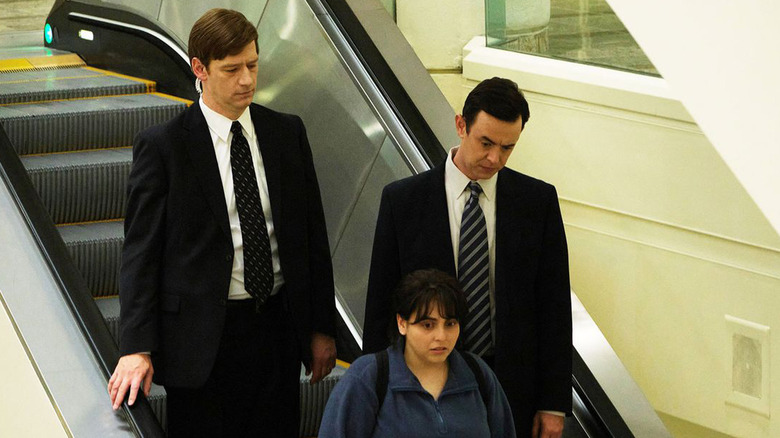Everything Impeachment: American Crime Story Got Right
"Impeachment" is the third season of the FX drama series "American Crime Story," which covers a recent scandal in American memory. After Season 1 chronicled O.J. Simpson's murder trial and Season 2 detailed the killing of Gianni Versace, Season 3 deals with the impeachment of President Bill Clinton (Clive Owen).
Anyone who lived through the scandal remembers how much it dominated the media. But "Impeachment" aims to tell different sides of the story than what most journalists covered the first time around. While President Clinton and his wife, Hillary (Edie Falco), do factor into the story, they're not the main characters. Instead, "Impeachment" focuses on former White House intern Monica Lewinsky (Beanie Feldstein) and her friend and ultimate betrayer, Linda Tripp (Sarah Paulson), giving plenty of screen time to their experiences and motivations. It also follows Paula Jones (Annaleigh Ashford) and her lawsuit against the president for sexual harassment. But rather than reduce Jones to a caricature, "Impeachment" explores how thoroughly manipulated she was.
While some elements of "Impeachment" are fictional — like any show that dramatizes real events — it's very much based on fact. The basis for "Impeachment" is Jeffrey Toobin's 1999 book, "A Vast Conspiracy: The Real Story of the Sex Scandal That Nearly Brought Down a President." But it's also based on direct personal accounts from some of the people involved. Monica Lewinsky actually served as a producer Season 3, giving the writers firsthand insight into what happened (via Variety).
With "Impeachment: American Crime Story" airing its finale on Nov. 9, 2021, it's time to look back on the major points that the show got right.
Linda Tripp's complicated motivations
Linda Tripp is often seen as a villain in the Clinton impeachment scandal. In 1998, only 12% of Americans had a favorable opinion of her (via CNN). By secretly recording her conversations with Lewinsky and then turning them over to the FBI, many Americans felt that Tripp had betrayed her friend, and that she did it for entirely selfish reasons. One popular theory was that Tripp just wanted a book deal (via The Washington Post). Another was that wanted revenge against the Clintons after she lost her White House job and was relegated to the Pentagon (via The Independent).
In reality, yes, both of those factors were in play. "Impeachment" is honest about the selfish side of Tripp's behavior. She's furious about losing her job and sees it as a demotion. She definitely angles for a book deal — when conservative book publisher Lucianne Goldberg (Margo Martindale) rejects Tripp's pitch for a book about her own experiences working at the White House, this convinces Tripp to start recording Lewinsky.
But Tripp had other motivations, too. Tripp thought that the president's behavior was an abuse of power. "I was so angry at him [Clinton]. I wanted this relationship exposed in the biggest way because it was so cruel. It was beyond cruel what he was doing to her," Tripp told ABC News in 2020. That's very close to what Tripp says in "Impeachment" episode 9 during her grand jury testimony.
When it came to the portrayal of Tripp, "Impeachment" won over an important critic: Tripp's daughter Allison. "[Paulson] has helped soften [my mom's image] and allowed for people to have a different vantage point of what really took place," Allison told Vanity Fair. "Because of that, I'd want to hug the s— out of her."
Monica Lewinsky and Bill Clinton's relationship
Like Tripp, the public had a negative impression of Monica Lewinsky. Her favorability rating was also just 12% (via CNN). Many viewed Lewinsky as a sex-obsessed stalker who couldn't get over Clinton — even senior White House aide Sydney Blumenthal thought so (via The Guardian).
But that doesn't track with what Lewinsky herself has said about the nature of her relationship with President Clinton, and "Impeachment" largely follows her side of the events. The show recreates many of the pivotal moments in their relationship, from their first meeting during a 1995 government shutdown, to their initial flirtations that included Lewinsky flashing her thong at him, to the genuine affection they felt for each other.
That matches Lewinsky and Clinton's descriptions of their relationship. In her 1998 testimony before Kenneth Starr's grand jury, Lewinsky talked about the tenderness they showed each other: "We would tell jokes. We would talk about our childhoods. Talk about current events ... there was a lot of hugging, holding hands sometimes. He always used to push the hair out of my face." Clinton, meanwhile, described Lewinsky as "a good young woman with a good heart and a good mind ... She talked to me a lot about her life, her job ambitions" (via Slate).
That being said, their relationship was inherently problematic. In 2014, Lewinsky wrote in Vanity Fair that it was an "abuse of power" on Clinton's part. "Impeachment" makes the power imbalance very clear. It spends multiple episodes detailing how Lewinsky lost her job at the White House because of the affair, and the level of influence that Bill Clinton had over her career. On both the show and in real life, Lewinsky was a willing participant. But that doesn't excuse Clinton's behavior, either.
Hillary and Bill Clinton's marriage
For much of their public lives, Bill Clinton's adultery and problematic behavior have been publicly known. And since the Clintons have remained married for over 40 years, that's led to questions about the nature of their relationship. Many have characterized it not as a loving marriage but as an "arrangement" made out of political expedience. In 1992, 60 Minutes journalist Steve Kroft used that exact word when the Clintons about Bill's affair with Gennifer Flowers (via The Washington Post).
But "Impeachment" portrays the Clintons' marriage as very much a loving one. Hillary Clinton (Edie Falco) only appears in a handful of episodes in "Impeachment," but she's a major presence on the show. When the news of Clinton's affair with Lewinsky first surfaces, Bill lies to Hillary about it. When the affair becomes public anyway, "Impeachment" portrays Hillary as feeling tremendously hurt and betrayed. The two spend an uncomfortable vacation together on Martha's Vineyard. It culminates in a huge fight, with Hillary telling Bill that she regrets sacrificing her own ambitions for his.
This is mostly in line with what Bill and Hillary have said about their relationship. Bill Clinton immediately disputed Kroft's question that day, and since then, both Bill and Hillary have often spoken about their genuine love for each other. And when Hillary found out about Bill's affair, she was genuinely shocked and hurt. In her 2014 memoir "Living History," Hillary wrote that when she found out the truth, she felt "dumbfounded, heartbroken and outraged that I'd believed him at all," admitting that she wanted to "wring his neck."
Only Bill and Hillary Clinton know what their marriage is really like. But "Impeachment" does follow what they've both said about it publicly.
Paula Jones and the forces that manipulated her
Paula Jones and her sexual harassment lawsuit against Bill Clinton play a major role throughout "Impeachment" Season 3. On the show, Jones starts out by simply wanting to be compensated for Bill Clinton sexually harassing her in a Little Rock hotel room while he was governor of Arkansas. But soon, the Jones lawsuit becomes a part of the ongoing conservative effort to undermine Clinton's presidency. After Kenneth Starr's (Dan Bakkedahl) Whitewater investigation fizzles out, conservative lawyers including Ann Coulter (Cobie Smulders) and George Conway (George Salazar) zero in on Jones' lawsuit as a way to trap Clinton into committing perjury.
Soon, Jones is working with a new conservative legal advisor, Susan Carpenter-McMillan (Judith Light), who urges her to make frequent media appearances. This puts a strain on Jones' relationship with her husband Steve (Taran Killiam), who suspects that Paula actually had an affair with Clinton. In one pivotal moment, Susan and Steve convince Paula to reject a $700,000 settlement offer from Clinton, and instead demand a public apology. Eventually the lawsuit is thrown out and the Joneses get nothing.
According to most sources, this is an accurate representation of how Paula Jones' lawsuit went down. In 2016, Paula told Penthouse magazine that she felt the right "used" her case to further its own agenda (via The Daily Beast). According to Madeleine Kaplan, researcher for Slate's "Slow Burn" podcast about the impeachment scandal, Paula was very much pressured into rejecting the deal (via Vulture). And in many ways, the Carpenter-McMillan-Jones dynamic mirrors the dynamic between Tripp and Lewinsky, with both Jones and Lewinsky being influenced by bigger forces than they realized at the time (via Slate).
What Monica went through after the scandal broke
"Impeachment" is honest about the effect that the exposure of the affair had on Monica Lewinsky. The Season 3 premiere kicks off with the moment that Tripp and FBI agents confront Lewinsky at the Pentagon City Mall, after which Lewinsky is interrogated for 12 hours — and Lewinsky calls Tripp a "treacherous b—-" to her face.
The scandal completely upends Lewinsky's life. She's under so much media scrutiny that she can't go out in public without a disguise, and she and her mother Marcia Lewis (Mira Sorvino) spend their days in Monica's apartment watching the coverage, most of which is negative. Various people from Monica's past come forward to disparage her publicly, like her former high school drama teacher with whom she had an affair. Perhaps worst of all, Kenneth Starr's legal team, led by a young Brett Kavanaugh (Alan Starzinski), forces Monica to recount every sexual interaction she had with Clinton, in excruciating detail. Those details then become a major part of the Starr Report.
At the time, the media very much did try to demonize Monica Lewinsky. Since then, she's been candid about what it was like to have her private life exposed to the country. Most of the details from "Impeachment" are accurate, like the disguises, the devastating media coverage, and the 12-hour interview with the FBI — the "treacherous b—-" line is a verbatim quote.
Monica Lewinsky went through hell as a 24-year-old in 1998, and "Impeachment: American Crime Story" is very much on her side.
If you or anyone you know has been a victim of sexual assault, help is available. Visit the Rape, Abuse & Incest National Network website or contact RAINN's National Helpline at 1-800-656-HOPE (4673).

